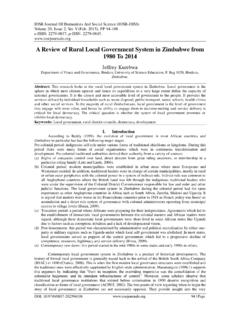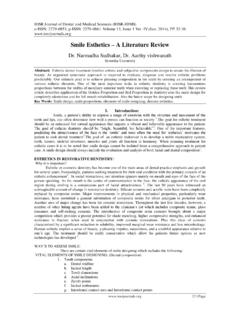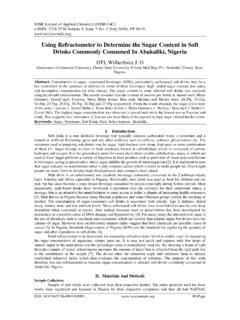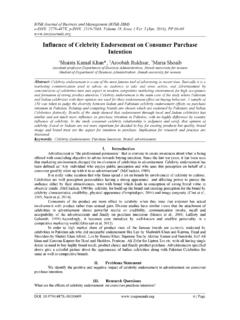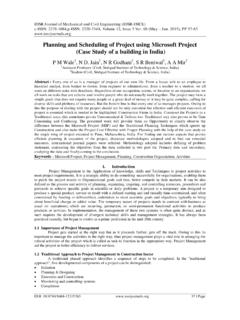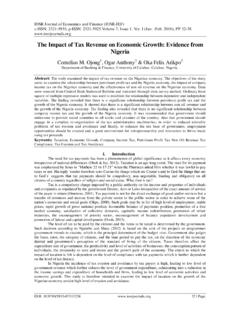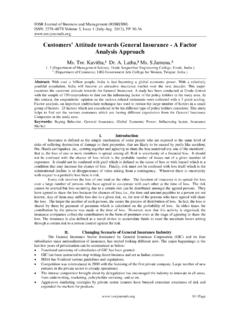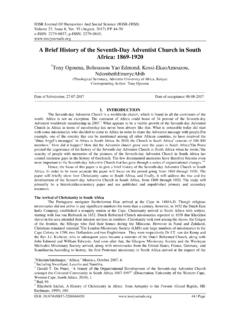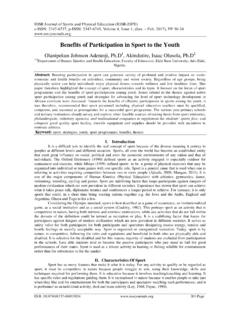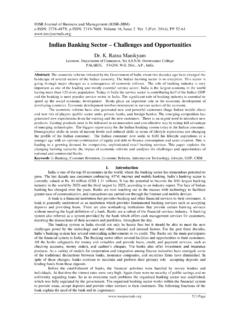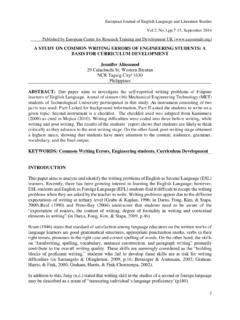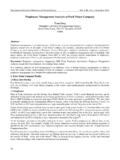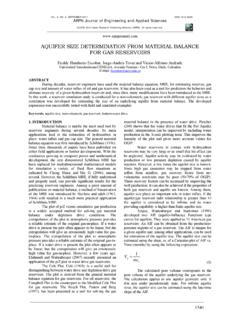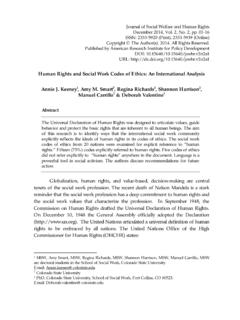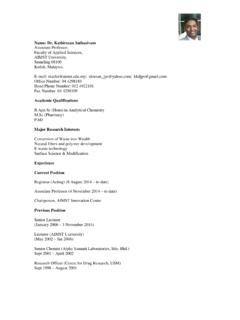Transcription of The Impact of Exchange Rate Fluctuations ... - IOSR Journals
1 IOSR journal of Economics and Finance (IOSR-JEF) e-ISSN: 2321-5933, p-ISSN: 7, Issue 3. Ver. I (May. - Jun. 2016), PP 07-15 DOI: 7 | Page The Impact of Exchange Rate Fluctuations on Private Domestic Investment Performance in Nigeria Jonathan , Emily 1 Gyang& Kenneth U. 2 Nnadi 1 Department of Economics, Faculty of Humanities, Social, and Management Sciences Bingham University, Karu, Nigeria. 2 Department of Maritime Management Technology, School of Management Technology, Federal University of Technology, Owerri, Nigeria. Abstract: Since September 1986, when market determined Exchange rate system was introduced, the naira Exchange rate has exhibited the features of continuous depreciation and instability. This instability and continued depreciation of the naira in the foreign Exchange market has resulted to declines in investments as a result of high degree of uncertainty in the Nigeria business environment, standard of living of the populace and increased cost of production which leads to cost push inflation.
2 Against this background, this research seeks to undertake an empirical analysis of the link between Exchange rate Fluctuations and private domestic investment in Nigeria. Descriptive statistics and econometric method were employed. Thus, simple averages of descriptive statistics, and Error Correction Model (ECM) technique within the Ordinary Least Square estimation were employed to analyze the various trends in the data. The descriptive statistics of the variables included in the model shows the existence of wide variations in the variables as depicted by the standard deviation of the Exchange rate variable that was unusually high. This depicts a high degree of volatility in the Exchange rate during the period under investigation. The findings suggest that, the depreciation of the currency and interest rate does not stimulate private domestic investment activities in Nigeria.
3 On the other hand, infrastructures, government size and inflation rate had a positive effect on private domestic investment in Nigeria. It is thus recommended that monetary authorities should adopt appropriate policy in appreciating the value of the naira as devaluation has been a mistake since 1986, reduce borrowing and lending charges to boast the performance of private domestic investment through stable macroeconomic environment. Keywords: Investment, Exchange Rate, Monetary Policy, Infrastructures, Interest Rates JEL Codes: E22, D51, E52, H54 and E43 I. Introduction Prior to the introduction of Structural Adjustment Program (SAP) in 1986, Naira enjoyed appreciable value against US dollar, a factor that creates opportunity for rapid economic growth and stability. With introduction of new economic program, the country began to suffer unstable Exchange rate that caused a high degree of uncertainty in the Nigeria business environment.
4 Domestic investors face enormous risk as no one, no matter how intelligent could predict the likelihood of the foreign Exchange market performance. The situation must equally have an effect on importation level of the country. Nigeria as a developing country striving to develop its industrial base needs to harness its foreign Exchange market to enable domestic investors import relevant machineries, equipments and raw materials for the industrial consumption (Abba, 2009). For Ngerebo-a and Ibe (2013), Exchange rate is the ratio between a unit of one currency and the amount of another currency for which that unit can be exchanged at a particular time. Exchange rate of currency is the link between domestic and foreign prices of goods and services. Also, Exchange rate can either appreciate or depreciate. Appreciation in the Exchange rate occurs if less unit of domestic currency exchanges for a unit of foreign currency while depreciation in Exchange rate occurs if more unit of domestic currency exchanges for a unit of foreign currency.
5 Economic history has shown that there are two common concepts of Exchange rate namely nominal Exchange rate and real Exchange rate. The nominal Exchange rate is the number of unit of domestic currency that must be given up to get a unit of foreign currency. In other word, nominal Exchange rate is the price of domestic currency in term of foreign currency. It is denoted as E. The real Exchange rate is the relative price of foreign goods in term of domestic goods. In other word, it is the Exchange rate adjusted for price. It is denoted as; e = Ep*/p. Where E= nominal Exchange rate, p* = foreign price and p = domestic price. Exchange rate is one of the economic indicators which directly affect investment as such its role in the overall economic objectives of a country cannot be underestimated. This gives confidence to why the public sectors, foreign investor and private individual pay a lot of attention to the Exchange rate variation.
6 The Exchange rate is among the most watched, analyzed and government manipulated macroeconomic indicators. Since September 1986, when the market determined Exchange rate system was introduced via the second tier foreign Exchange market, the naira Exchange rate has exhibited the features of continuous depreciation and The Impact of Exchange Rate Fluctuations on Private Domestic Investment Performance in Nigeria DOI: 8 | Page instability. People have not been investing due to Exchange rate volatility. This instability and continued depreciation of the naira in the foreign Exchange market has resulted in declines in the investment, standard of living of the populace, increased cost of production which also leads to cost push inflation.
7 It has also tended to undermine the international competitiveness of non-oil exports and make planning and projections difficult at both micro and macro levels of the economy. A good number of small and medium scale enterprises have been strangled out as a result of low dollar/ naira Exchange rate and so many other problems resulting from Fluctuations in Exchange rates can also be identified (Adelowokan, Adesoye and Balogun, 2015). This frequent appreciation of the dollar against the naira has led to sharp drop in private domestic investment in the country (See Fig. 1 below). At the firm level for instance, Exchange rate movements and its volatility had led to poor performances of private domestic investment in Nigeria. For example, private domestic investment declined from 34% of GDP in 1981 to 10% of GDP in 1988.
8 Private domestic investment declined further to 7% of GDP between 1995 and 1996 and hovered around 8% of GDP to 10% of GDP from 1997 to 2003 before dropping to all time low of 5% of GDP in 2005. This downward trend in private domestic investment may partly be due to instability in the Exchange rate and political instability. Private domestic investment then increased to 17% in 2010 and fluctuates around 16% and 15% of GDP between 2011 and now. Also, despite various efforts by the government to maintain a stable Exchange rate, the naira has depreciated throughout the 80 s. It depreciated from in 1981 to in 1986 and further to in 1990, all against the US dollar. The policy of guided or managed deregulation pegged the Naira at against the US dollar in 1994. Further deregulation pushed it to in 1999.
9 It depreciated further to in 2002. Thereafter, the Exchange rate appreciated to in 2005 and later in 2008. Towards the end of 2008 when the Global Financial Crisis took its toll, the naira depreciated to at the end of 2009 and presently the value of the naira against the US dollar is now #199=$ During this period, the economy recorded wide Fluctuations in Exchange rate and private domestic investment as depicted in figure 1 below: Figure1: Trend of Exchange rate and Private Domestic Investment in Nigeria 2011200620011996199119861981543210 YearDataREXRPDIV ariableTrends of Private Domestic Investment and Real Exchange Rate in Nigeria Source: Author, using data from CBN and the World Bank (2014). Figure 1 shows a declining trend in private domestic investment between 1986 and 2010. After this period, the share private domestic investment as a percentage of gross domestic product began to rise.
10 The figure also reveals that the naira maintained upward trend throughout the study period with little variations here and there. This is a strong indication of the un-abating depreciation and instability of the naira Exchange rate. The above downward trend in private investment is in line with the argument of Bleaney M., & Greenaway D (2001) who point to a decline or stagnation of private investment during the immediate past reform years. Political instability has made the climate for private saving and investment hostile in Nigeria. Also, the downward trend in private investment can be attributed to political upheavals in the country and policies inconsistency over time. The confidence of people must be rebuilt by putting a lasting solution to the political instability in the country so as to give room for more investment opportunities in the country.
